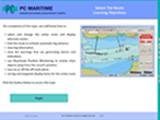Navmaster ECDIS Training CD Released
PC Maritime has announced that its Navmaster ECDIS type-specific training CD Rom is now available.
Believed to be the first manufacturer to provide a stand-alone type-specific training CD Rom, PC Maritime has taken the view that the required training should be made as convenient as possible to the customer. As Anne Edmonds, PC Maritime’s Marketing Director, explains: “One Navmaster ECDIS type training CD Rom onboard can be used by any number of ship’s officers, as and when their time permits. Internet access is not required, although we will later add a web-based version for shore use. The CD Rom will enable our customers worldwide to comply with the STCW requirement that all watchkeeping officers must have familiarisation training in the ECDIS they use. To complete the whole course will take about eight hours, after which a controlled assessment test can be taken and a competency certificate issued.”
Ms Edmonds states that CBT is effective, repeatable and gives the shipowner greater flexibility to move officers between ships. Most fleets have more than one ECDIS supplier. With the Navmaster CD onboard, a navigating officer could join a Navmaster-equipped ship and be competent and certified in operating the ship’s ECDIS within a short time, thus meeting Flag and Port State requirements. “We believe the CD Rom will simplify familiarisation training for Navmaster ECDIS users. It requires only a PC and email, and overcomes the logistical issue of getting officers to attend type-specific courses.”
The Navmaster ECDIS CD Rom gives thorough and interactive training in all aspects of Navmaster operation, divided into lessons. Each lesson provides voice-over and text explanations, and video sequences demonstrating on-screen processes. The user interacts frequently during training, carrying out actions exactly as they would be done on Navmaster ECDIS. At the end of each topic the user must answer questions to reinforce the learning.
An Assessment section contains the entire bank of questions so that a test can be taken under controlled conditions and documented. PC Maritime sets a statistically-sound pass rate; the user cannot achieve a pass by guessing. On passing the Assessment, a temporary certificate is produced to email to PC Maritime with proof of supervision and identity in order to meet a company’s Safety Management System procedures.
As PC Maritime’s Managing Director, David Edmonds, stated in a recent presentation at the ECDIS Revolution conference in London: “Studies have shown that a primary cause of training failure occurs when trainees do not use soon afterwards what they have learned from the course. As much as 70% of learning may come from actually doing the job, picking up from colleagues. This is not an argument for leaving any part of ECDIS training to informal means, but to emphasise the need to practise what has been learnt. Since we are encouraging all of our customers not to leave things to the last minute, it follows that those who ensure they are ahead of the game can find weeks or months passing by before the course attendees actually use the equipment. This is especially true of type-specific training since many officers will find themselves being transferred between ships that employ ECDIS systems supplied by different manufacturers. In such cases, the ability to re-familiarise oneself with each system using CBT methods is invaluable.”
Mr Edmonds added: “Many people today are comfortable studying online. They don't want to sit through classes when they can work at their own pace, with the opportunity to practise the skills and actions they need, which is more efficient for them. If e-Learning is interactive enough to give them hands-on experience, then e-Learning can be very effective.”
Using CBT-based systems has further benefits, believes Mr Edmonds:
“In my experience, following an on-board training day, an officer will say, “I’m away on leave tomorrow – I’ll try to pass on what you’ve told me to my replacement”. This gives rise to “trickle down training” which is widely regarded as unsatisfactory. It’s much better if an officer can work at his own pace over a longer period, especially since this also reduces the risk of information overload (by mid-afternoon), and accommodates interruptions, which seem to be a way of life for all of us nowadays.”
David Edmonds’ paper at the ECDIS Revolution conference can be downloaded from PC Maritime’s website: http://www.pcmaritime.co.uk/library.html














